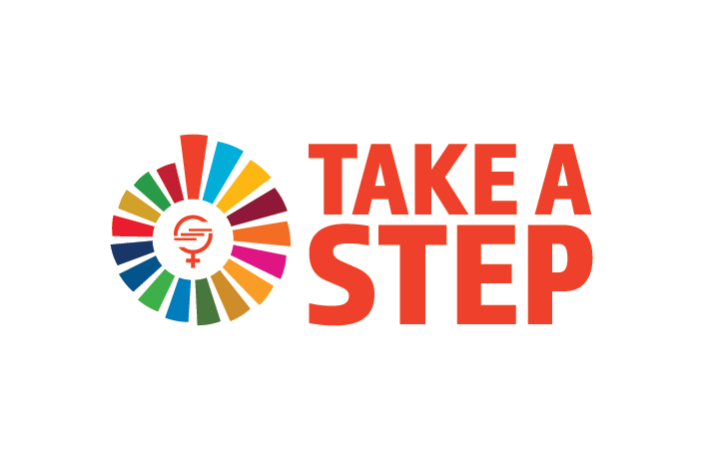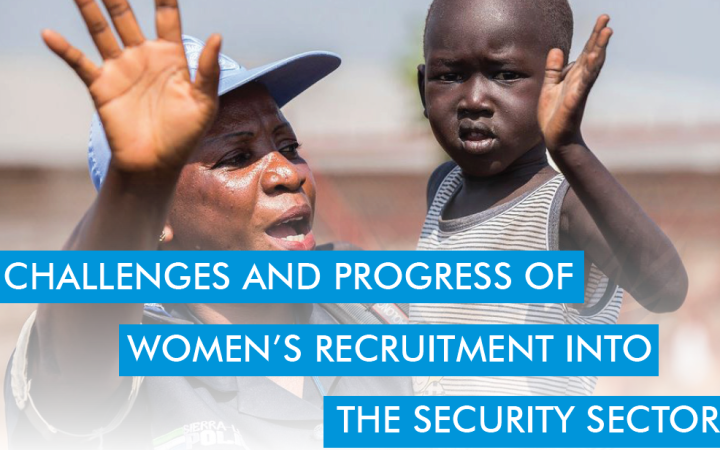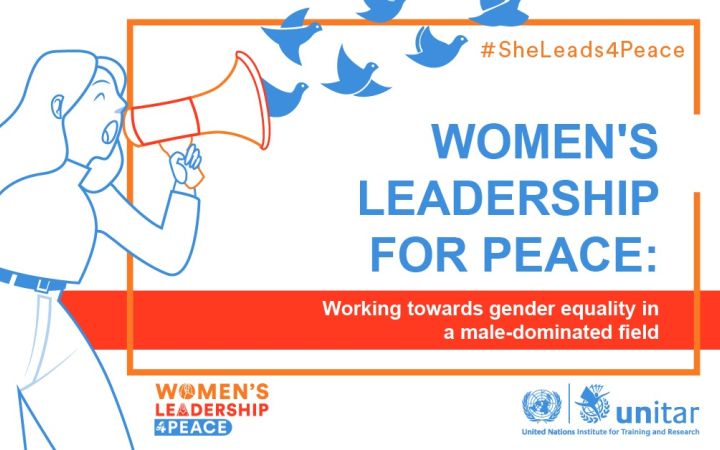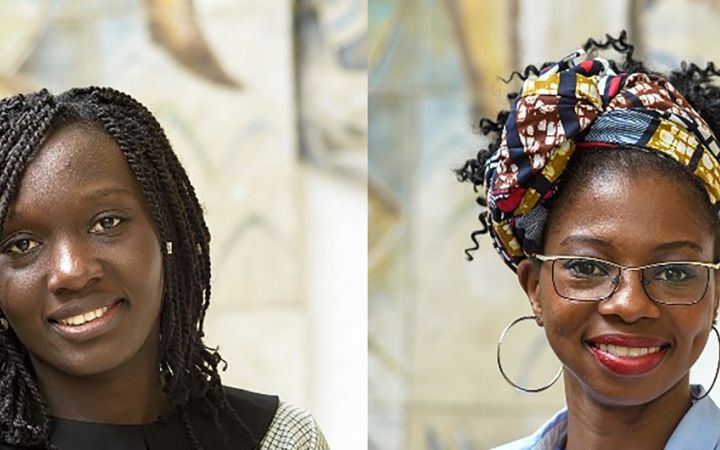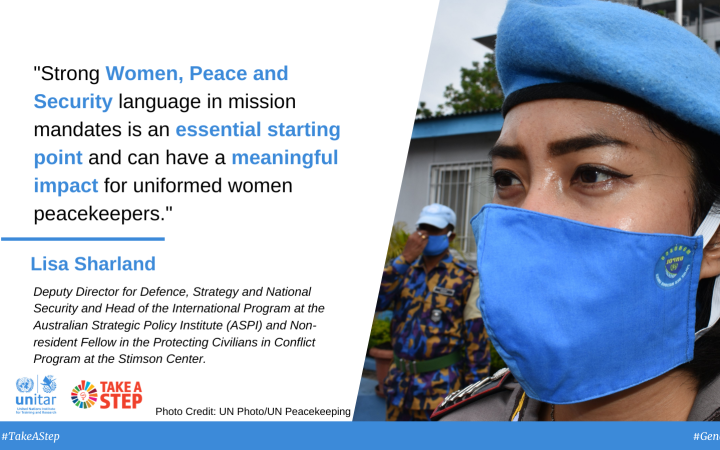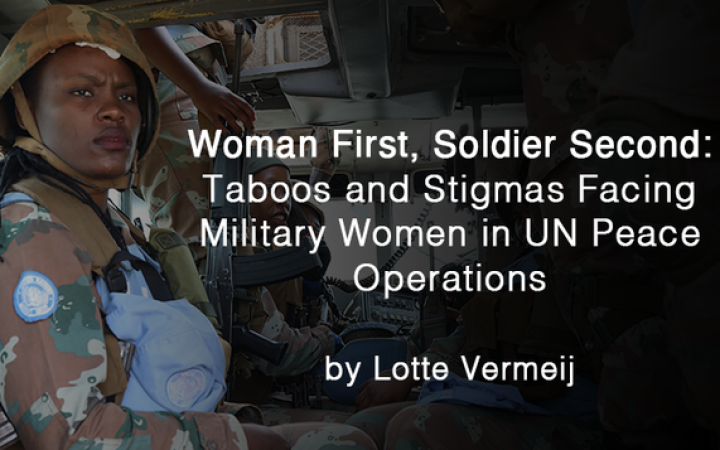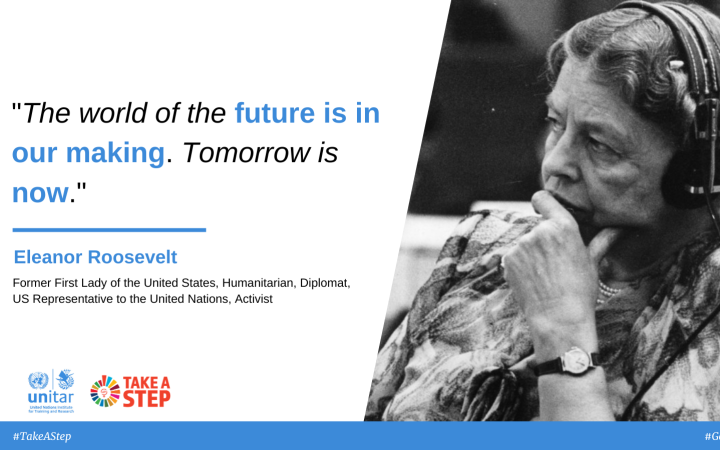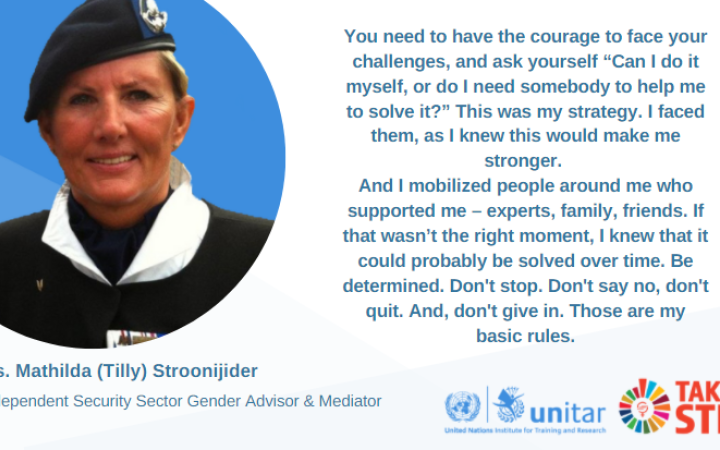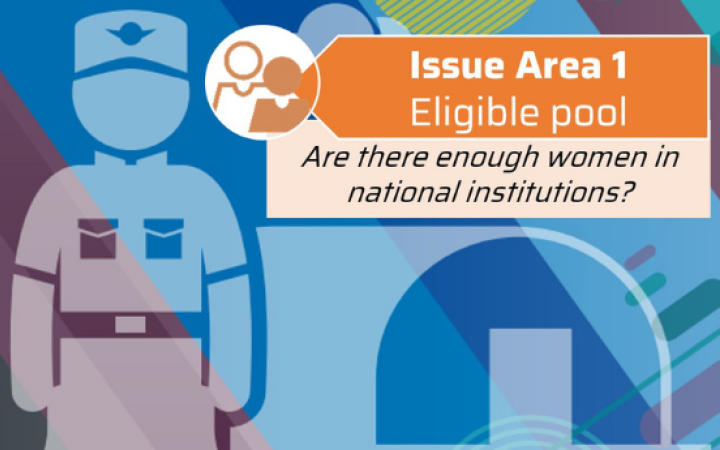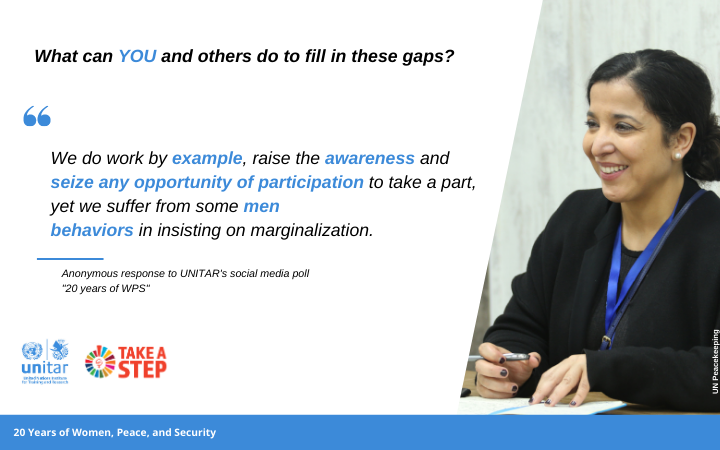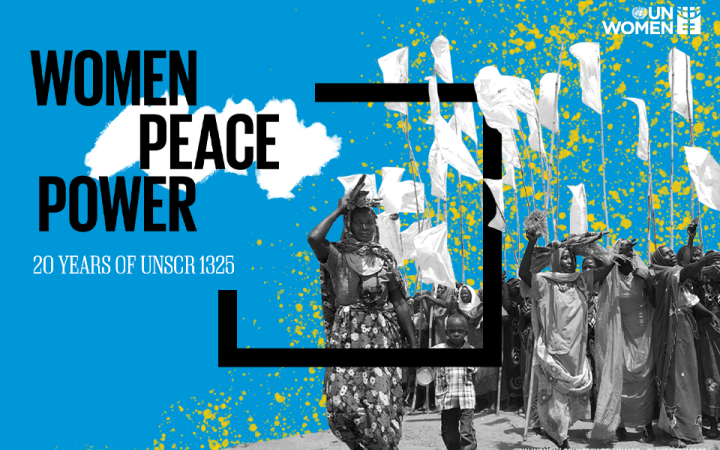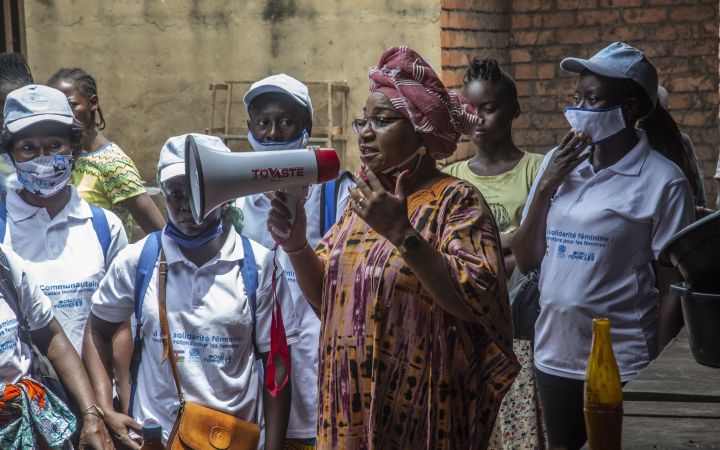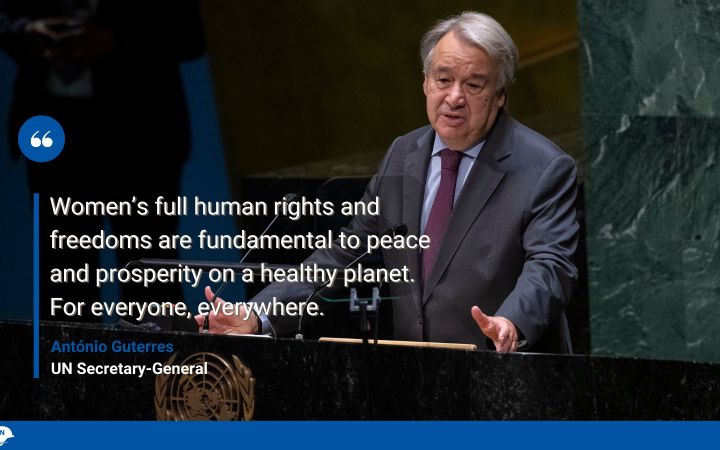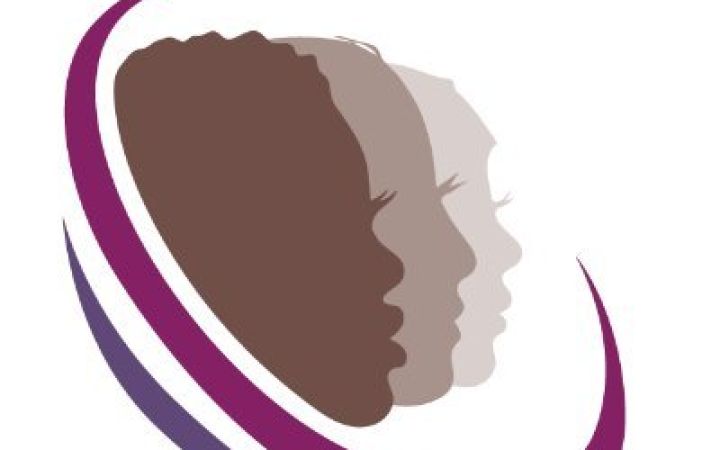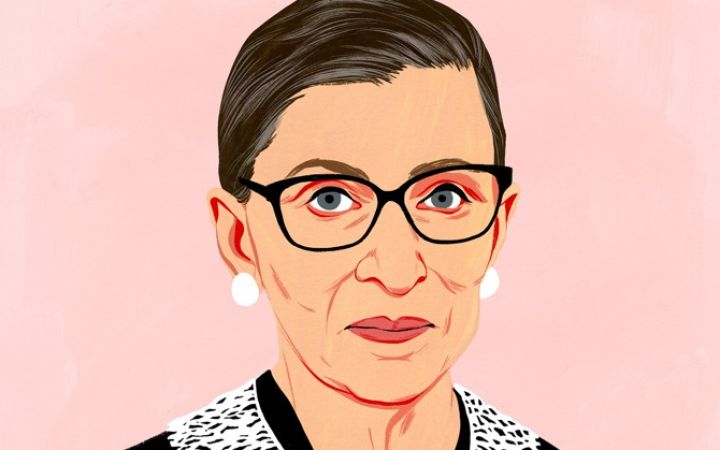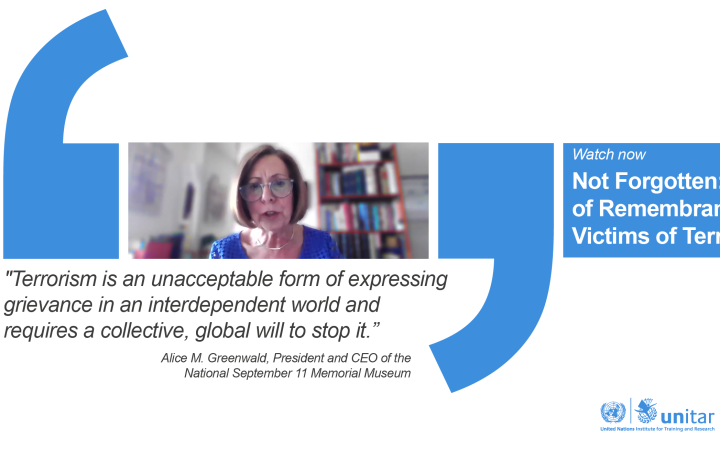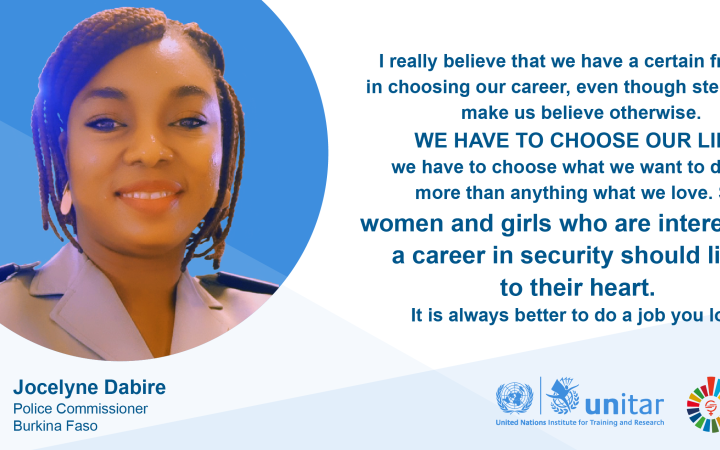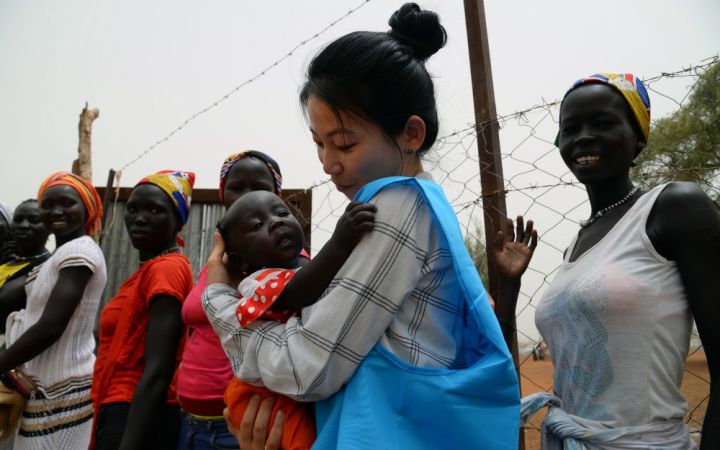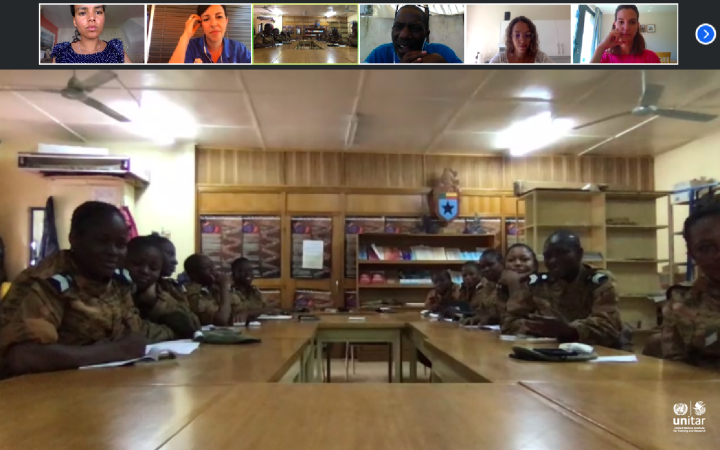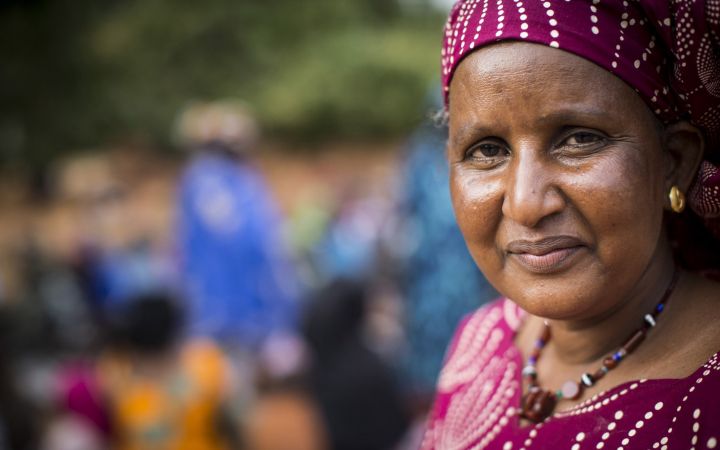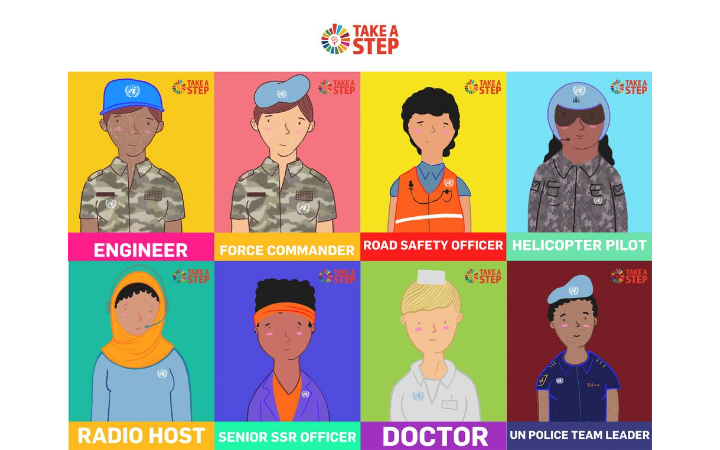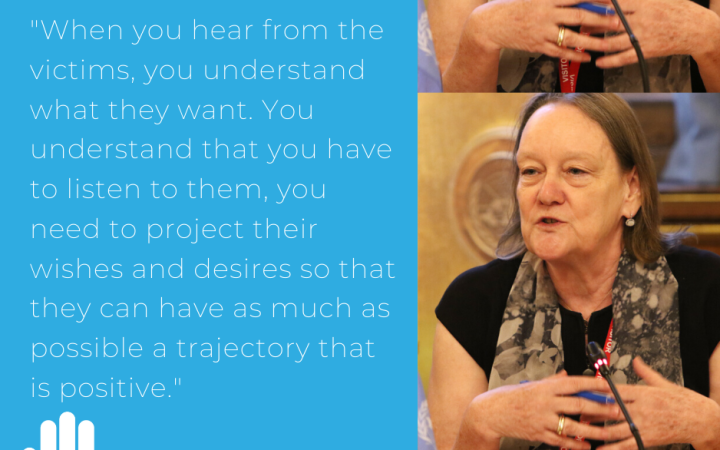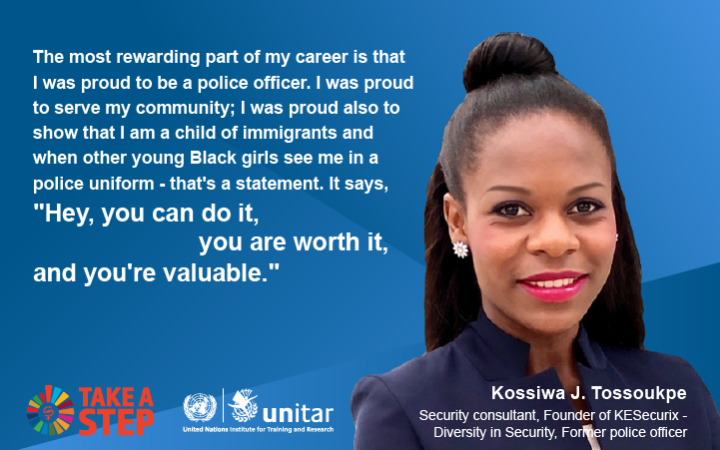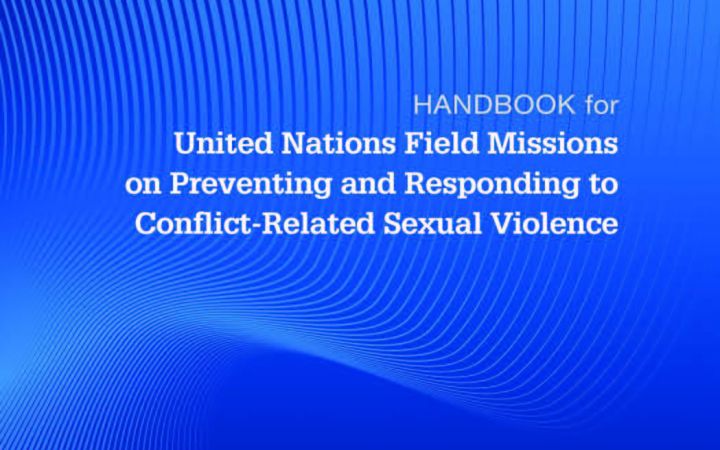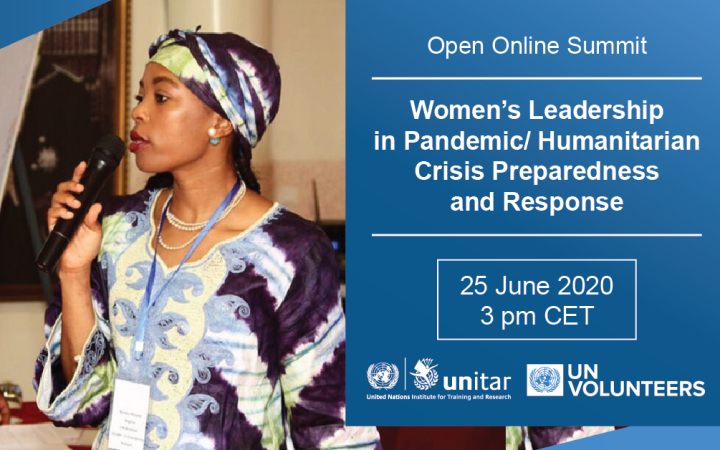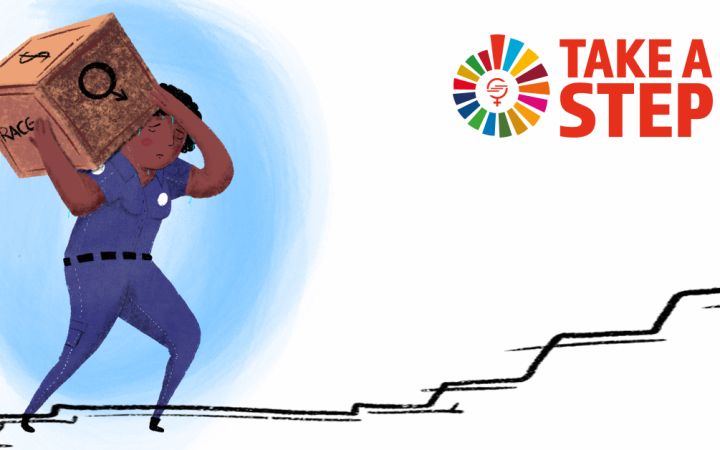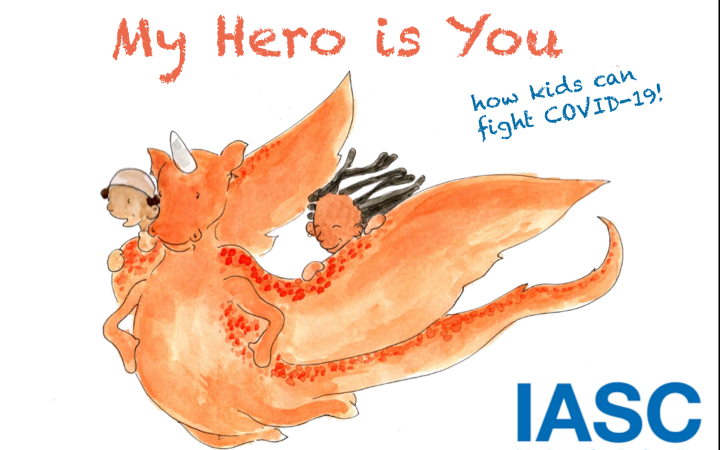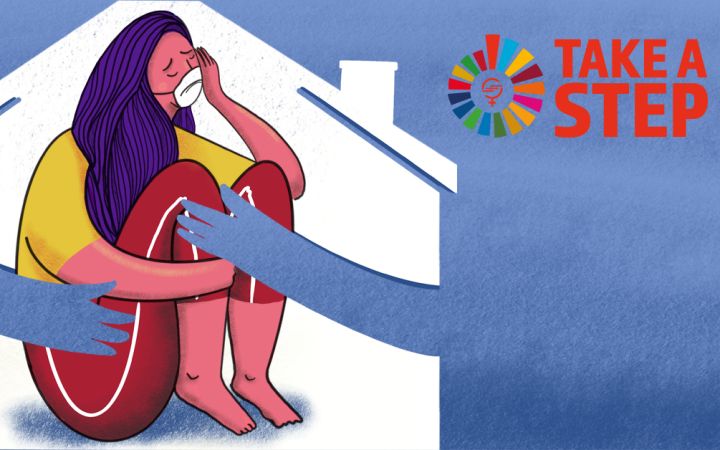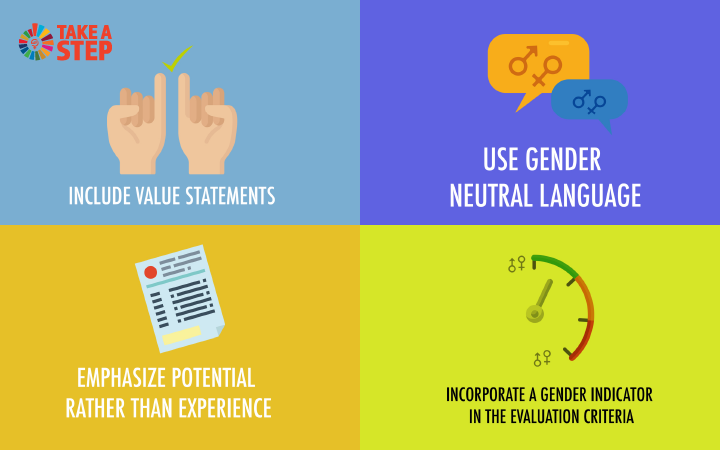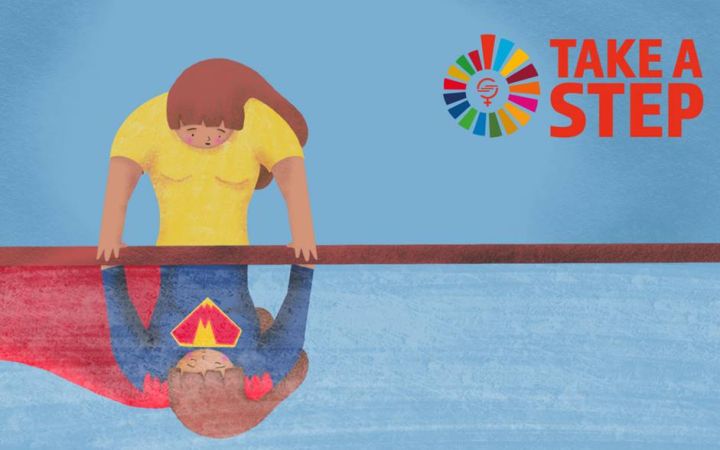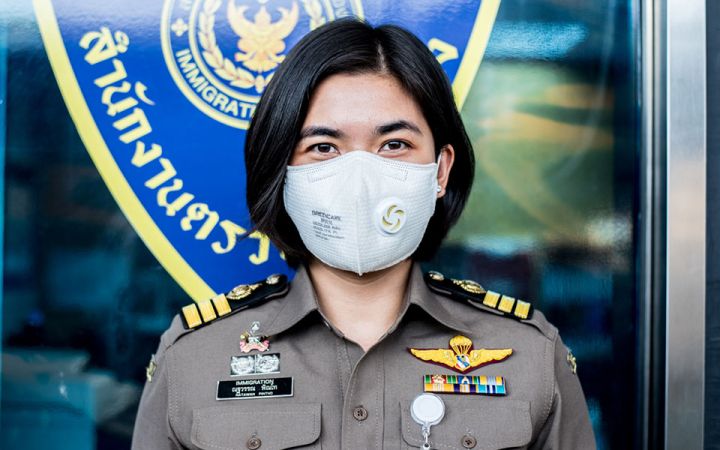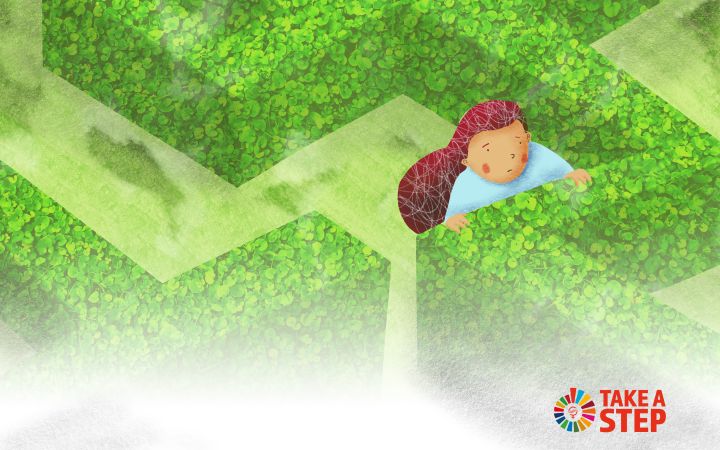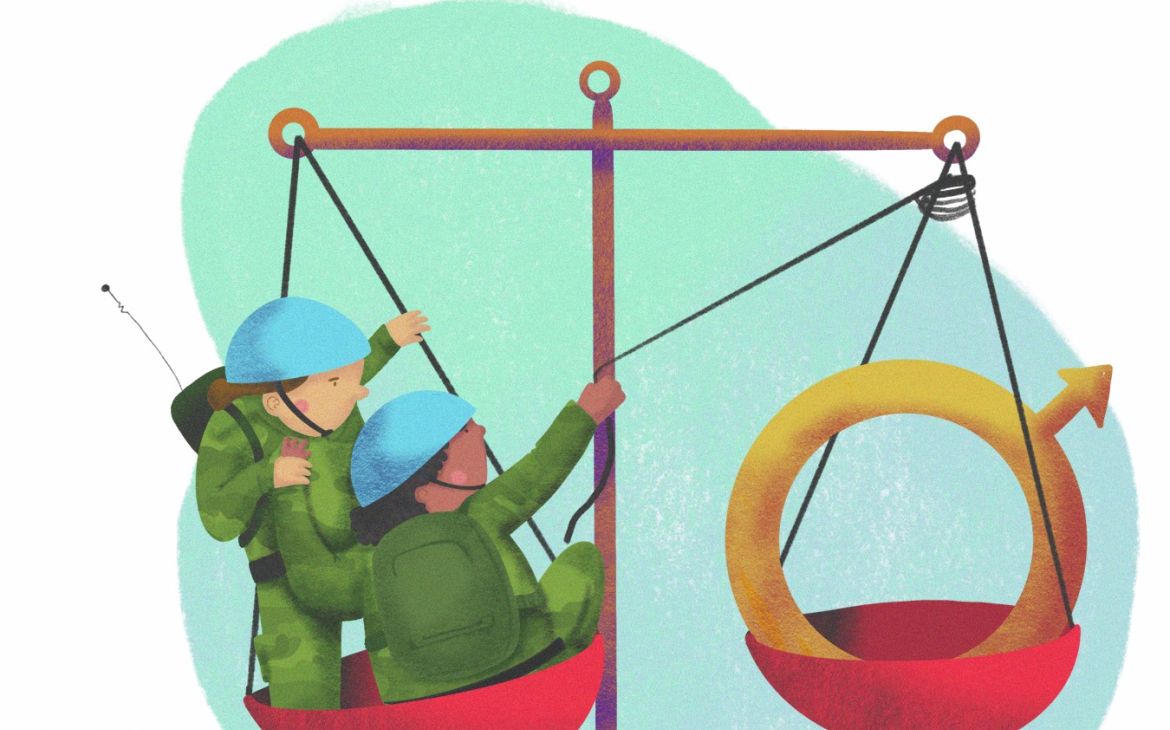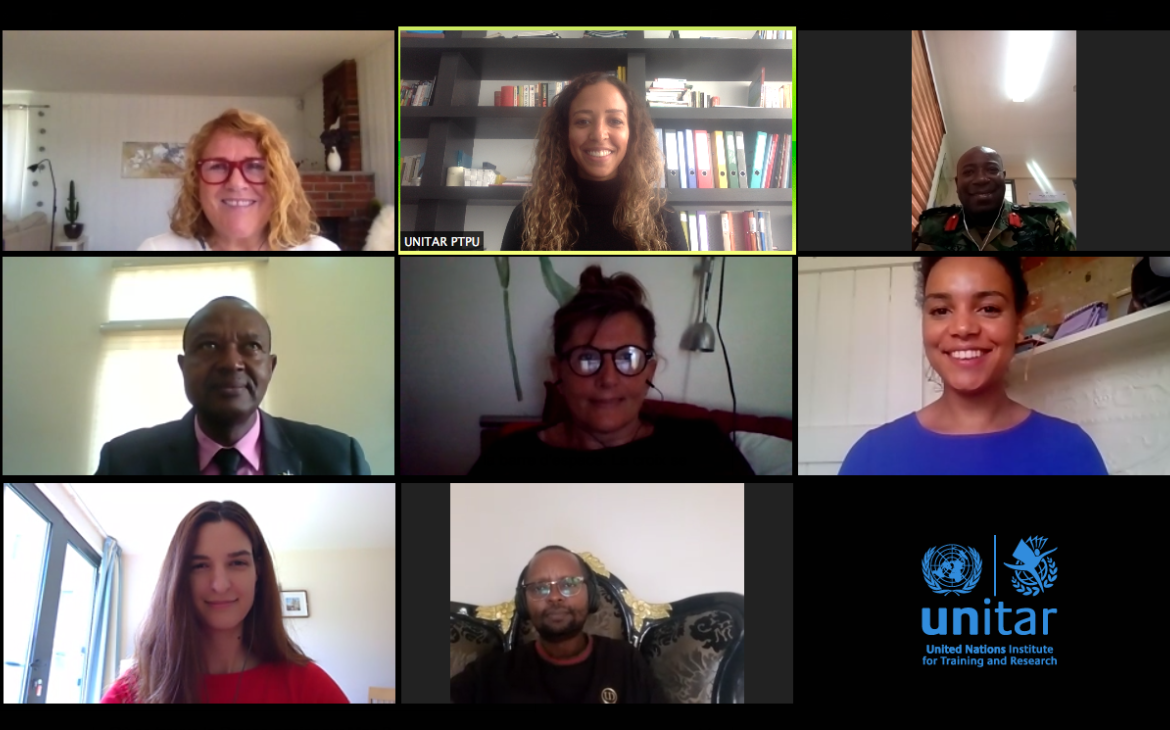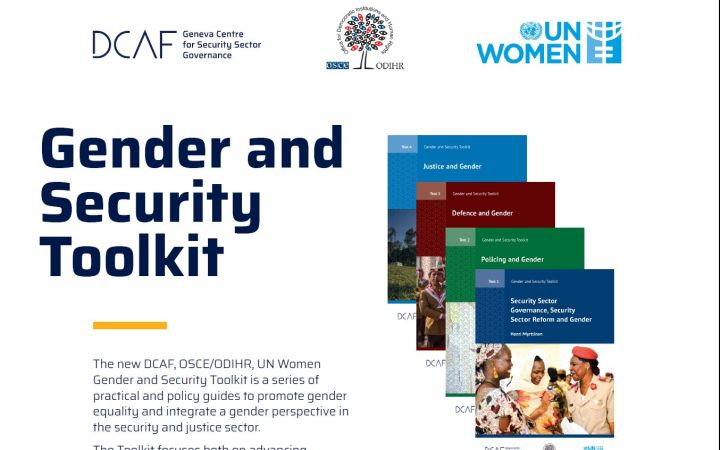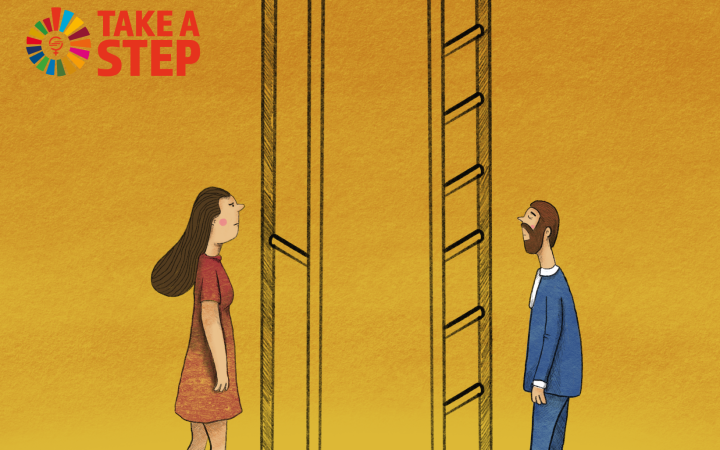International Women’s Day is an important reminder of the enormous role that women have historically played and continue playing in their communities and globally for the achievement of a peaceful and sustainable future. Yet, at UNITAR, we believe that celebrating women and their achievements should go beyond a single – albeit important – date, as each day presents opportunities to take an active step towards gender equality and the empowerment of women.
Therefore, starting on 6 March 2020, UNITAR will launch a social media campaign #TakeAStep dedicated to the amplification of women's voices and their achievements, as well as sharing tools which women can use to empower themselves. We want to acknowledge those ordinary actions and small stepping stones that lead women to greatness – however they choose to define it. To help translate awareness into action, as a capacity-building arm of the United Nations, UNITAR will offer concrete tools which can help along the way in the journey towards achieving gender equality. Every Friday, we will present a new or existing tool, an opportunity or an example of how it has been used/seized. Also, once a month, we will share a story of an inspiring woman who took an active step – however small – towards the empowerment of herself or others. Each such story will serve as an example of how women make use of the available opportunities, means and channels to amplify their voices and enable and inspire action, or – in the absence of such opportunities – of how they can be created, providing the tools that can be used to do so.
The campaign will initially focus on women in the security sector, working to be as inclusive as possible in its definition of ‘women’, encompassing differences in age, disability, race, ethnicity, sexual orientation, economic status, and gender identity. It will support the meaningful engagement of women in the promotion and defence of global peace, in line with the UNSCR 1325, Elsie Initiative, SDGs 5 and 16, and other relevant policies and instruments.
The campaign will aim to raise awareness of the available opportunities for women to succeed and make a difference in the security sector – whether through training, education, advocacy or other means – and will contribute to fighting stereotypes, inciting confidence, spreading knowledge, changing mindsets, and presenting opportunities for change in relation to the Women, Peace and Security (WPS) agenda.
Want to find out which step you can take today to empower yourself and your peers? Follow us on Twitter, Facebook and LinkedIn. #TakeAStep now, share your story using the hashtag and let others know that you are joining the power movement!
We regularly share new tools below.
Because every step matters.
Progress and Challenges of women's recruitment in peace and security
"On a socio-cultural level, women wanting to join the security sector often face discrimination, prejudice and stereotypes."
In a new issue of the Center of Excellence for Stability Police Units magazine, UNITAR experts reflect on the progress made and persisting challenges related to women's recruitment into the peace and security sector.
Access the full issue here or download the article in the "Interesting to Explore" section at the bottom of this page ?
Women's Leadership for Peace - Join the Official Programme Launch
In 2020, both the 25th anniversary of the Beijing Declaration (1995) and the 20th anniversary of the UN Security Council Resolution 1325 (2000) marked key opportunities to take further steps in ensuring that women's empowerment and gender equality are at the heart of all aspects of the United Nations' work. To contribute to the advancement of more women in the peace and security fields into leadership positions through targeted capacity building measures, UNITAR started developing the Women's Leadership for Peace programme in 2020. This programme will leverage all UNITAR's experience in providing skills and knowledge to overcome the underrepresentation of women in formal and informal mechanisms and institutions linked to sustaining peace.
On the occasion of the International Women's Day 2021, held under the theme “Women in leadership: Achieving an equal future in a COVID-19 world”, you are cordially invited to join the official virtual launch of the Women's Leadership for Peace programme on the 11th of March 2021, at 3 pm CET. Save the date and register here.
Learn more about the event and the programme.
Black women in science
February marks two important occasions: Black History Month, observed in the United States and Canada, and the International Day of Women and Girls in Science, celebrated on 11 February. The most high-risk peacekeeping missions are on the African continent, where the ongoing COVID-19 pandemic continues to take and disrupt lives and livelihoods. On the frontline of this public health crisis are women scientists, whose hard work and determination play a crucial role in the success of peacekeeping missions. Whether as electrical engineers, who manage power generation and distribution systems for UN peacekeeping camps, or geotechnical engineers designing airfield infrastructure, roads and bridges, women – and Black women in particular – play an incredibly important but often insufficiently recognised part. Take the example of Katherine Johnson, who was only recently widely celebrated for helping put the first person on the Moon.
We are therefore proudly shining a spotlight on Racky Balde and Tatenda Zinyemba, two talented scientists from Senegal and Zimbabwe who have studied the impact of COVID-19 in Africa. Read more about their work here: https://news.un.org/fr/story/2021/02/1089192
Words Matter
Words matter! Using inclusive language in mission mandates has a meaningful impact for uniformed women peacekeepers and "can help confront stereotypes about the roles and responsibilities of women in peacekeeping missions".
#TakeAStep and read the policy brief and recommendations by Ms. Lisa Sharland published by the International Peace Institute: Women, Peace, and Security Mandates for UN Peacekeeping Operations: Assessing Influence and Impact.
Taboos and Stigmas Facing Military Women in UN Peace Operations
In 2021, let's continue taking active steps towards #GenderEquality together! Our first #TakeAStep post this year is dedicated to this illuminating report: Woman First, Soldier Second: Taboos and Stigmas Facing Military Women in UN Peace Operations, by Lotte Vermeij.
Women in uniform continue to face taboos and stigmas that are barriers to their inclusion and successful deployment. These range from gender stereotypes that cause military women to face more scrutiny than their male counterparts to difficulties speaking up about discriminatory and sexualized behaviour, including racism, sexual harassment, and assault.
#TakeAStep today and read the full report to find out about the author's brilliant recommendations for the UN and national defence institutions.
SMALL STEPS TOWARDS GENDER EQUALITY – REFLECTIONS ON THE ROAD
Over the past nine months, committed to our role as a knowledge sharing hub, UNITAR’s dedicated team has been collecting, compiling and sharing stories, reports, studies, tools, celebrations, resources, events and much more exposing and challenging existing barriers and stereotypes in one of the sectors most affected by them – peace and security. Spreading the word about the impressive amount of work being done by women to promote peace and to encourage, inspire and enable other heroines to follow their path – through 34 posts in total – has been a fantastic learning journey for us as well. As 2020 – the year of unprecedented challenges presented by COVID, but also a milestone anniversary of both the Women, Peace and Security agenda and the UN itself – is coming to an end, it is not time to stop, but maybe time to take a breath and look back at the long and winding road behind. We invite you to do so with us by reading our mid-way article from the last UNITAR external newsletter in 2020.
#TakeAStep Interview Series - Mathilda (Tilly) Stroosnijder
We are happy to announce the third #TakeAStep interview, with Ms Mathilda (Tilly) Stroosnijder, a peacekeeping veteran and gender adviser in the security sector. She shared with us her extensive experience, exceptional career path, and her lessons learned on overcoming challenges as a woman working in the security sector. Follow our campaign to learn more about her work, and reflections on the progress (to be) made in the field of peace and security.
The full interview is now available on UNITAR Medium.
Official Launch of “The Measuring Opportunities for Women in Peace Operations” Methodology
This week, Geneva Centre for Security Sector Governance (DCAF) has officially launched “The Measuring Opportunities for Women in Peace Operations" Methodology!
#TakeAStep today and learn how to meaningfully support women's participation in peace operations from the perspectives of the troop- and police-contributing countries (TPCCs). This innovative tool was developed in the framework of 2017 Elsie Initiative for Women in Peace Operations, with the aim to challenge the status quo in the pursuit of gender equality.
Access the tool here.
Your Response to 20 Years of Women, Peace and Security!
31 October 2020 marked the 20th anniversary since the adoption of the UN Security Council Resolution 1325 on Women, Peace and Security. As a result of this landmark resolution, the face of peace and security has changed forever.
#TakeAStep as we commemorate this occasion by sharing YOUR inspiring ideas and observations for current female changemakers and for the generations of women to come!
More to come soon and thank YOU for your participation!
20 Years of Women, Peace and Security - Have your say!
31 October 2020 marks the 20th anniversary since the adoption of the UNSCR 1325 on Women, Peace and Security. The Women, Peace and Security agenda has shown that gender equality is not just a social justice issue, but is essential to creating lasting peace. It has demonstrated that peace and security efforts are more sustainable when women are equal partners in delivering relief and recovery efforts and forging long-lasting peace. As a result of this landmark resolution, the face of peace and security has changed forever.
As we approach 20 years of women, peace and security, we would like to ask YOU 3 simple questions that could help us identify possible ways forward to fill in the persistent gaps in women's meaningful inclusion in peace and security efforts. The survey available through the link below is anonymous and should not take more than 5 minutes to fill in. We will share the most interesting ideas on our public channels to serve as inspiration for current changemakers and for the generations to come.
Thank YOU for your contribution! Take the survey here > https://www.surveymonkey.com/r/D3TLYRX
Thank you UN!
2020 is an important year in the United Nations calendar. With the 75th anniversary of the UN and the 20th anniversary of the Women, Peace and Security agenda fast approaching, let us reflect on the historic achievements of the United Nations. The UN2020 Campaign and the Feminist and Women’s Movement Action Plan for Beijing + 25 highlight the importance of strengthening UN institutions, norms and processes, while increasing its accountability and accessibility to civil society.
To celebrate this, the Global Network of Women Peacebuilders and Feminist and Women’s Movements Action Plan are coordinating the UN Security Council Resolution 1325 (women, peace and security) chapter in the Thank You UN! book. Submissions can range from written, audio, video or artistic. #TakeAStep today and share your Thank you UN! by submitting your content (written, audio, video or artistic) here by October 25, 2020: http://bit.ly/1325-Chapter
Today and every day, let us say #ThankYouUN!
The 20th anniversary of UNSCR 1325
UNSCR 1325 was a landmark resolution that has changed the face of peace and security forever. It demonstrated that peace and security efforts are more sustainable when women are equal partners in preventing violent conflict, delivering relief and recovery efforts, and forging lasting peace. As we approach the 20th anniversary of this landmark resolution, #TakeAStep today by delving into DPO's campaign celebrating 20 years of Women, Peace and Security. Anniversaries are as much about looking forward as they are looking back and, after 20 years and ten resolutions, it is clear that there is still a great deal to be done. Will you be a part of this change? #TakeAStep today and state your commitment to another 20 years (and more!) of #WPS and #BuildingBackBetter.
Black History Month
1 October 2020 marks the start of Black History Month in the United Kingdom, the Netherlands and Ireland - a month of celebrating the achievements of Black people throughout history. #TakeAStep today and celebrate this important month by learning about the essential work that Black women are undertaking in the field of peace and security. One such organisation is Women of Color Advancing Peace and Security. They are working tirelessly to advance the leadership and professional development of women of colour in the fields of international peace, security, and conflict transformation.
We are also delighted to share this upcoming exciting UN/AU initiative. To celebrate the 20th anniversary of UNSCR 1325, the African Union and the United Nations are collaborating to publish a commemorative book that aims to create a space for women who have been involved in maintaining and promoting peace and security on the continent. It will amplify the voices of the many African women who have made outstanding contributions towards building peace in Africa, sending a message of encouragement to the next generation of African women to claim their rightful place in history and create the ‘Africa they want’. Stay tuned for more news. Happy Black History Month!
Justice Ruth Bader Ginsburg's Legacy - 15/03/1933-18/09/2020
Today, we commemorate US Supreme Court Justice Ruth Bader Ginsburg, and her profound legacy. She was a tireless warrior for gender equality, passionate about the advocacy of women's rights, civil liberties, and the rule of law. Let us honour her tremendous impact on this world. As we work on lowering the many barriers women face to meaningfully participate in peace operations, let us #TakeAStep and reflect on Justice Ruth Bader Ginsburg’s words:
"As women achieve power, the barriers will fall. As society sees what women can do, as women see what women can do, there will be more women out there doing things, and we'll all be better off for it."
Gender Pay Gap
18th September 2020 marks the first ever International #EqualPayDay. #TakeAStep today by watching this clip and learning about the pioneering work of the Equal Pay International Coalition (EPIC). Led by the ILO, UN Women and partners, EPIC's goal is to achieve equal pay for all. By bringing together a diverse set of actors with different areas of focus and expertise, EPIC supports governments, employers, workers, and their organisations to make concrete and coordinated progress towards this goal. EPIC is currently the only multi-stakeholder partnership working to reduce the gender pay gap at the global, regional and national levels.
Let's all join together and contribute to making a change as we celebrate this historic day by promoting equal pay for work of equal value - in the peace and security field and beyond.
9/11 - women in counter-terrorism and preventing and countering violent extremism
As we remember the events of September 11th 2001 and other devastating terrorist attacks around the world, let us also take a moment to celebrate the brilliant and often underappreciated women working in counter-terrorism.
As Joana Cook, author of "A Woman's Place: U.S. Counter-terrorism Since 9/11”, stated: "There is so much work that must be done in this space [women in counter-terrorism], and I hope that the next generation of women can see themselves getting involved in, leading, and shaping security policies and practices going forward. I hope that this can be further supported by diverse partners and governments who fund and support such efforts."
#TakeAStep today with this factsheet on gender and CVE from the UN Office of Counter-terrorism and brief remarks of Ms Alice M. Greenwald, President and CEO of the National September 11 Memorial Museum, which she delivered at the “Not Forgotten: Stories of Remembrance of Victims of Terrorism” event this past August (48:20-51:15). If memorials are the way that we make promises to the future about the past, then let us make a promise today to recognise the essential role that women play in counter-terrorism and to encourage the next generation of leaders in this field. After all, you cannot be what you don't see.
#TakeAStep Interview Series - Jocelyne Dabire
We are delighted to announce the second woman to be profiled in our #TakeAStep interview series. Jocelyne Dabire is a police commissioner from Burkina Faso. Talking stereotypes, motherhood and being brave enough to take that leap of faith - all of this in our next article to be published next week. #TakeAStep and stay tuned to learn more about Jocelyne's inspiring career trajectory in the field of peace and security. The interview is available on UNITAR Medium in English and French.
***
Nous sommes ravis d'annoncer le nom de la deuxième femme dont le profil sera présenté dans notre série d'entretiens #TakeAStep. Jocelyne Dabire est commissaire principal de police au Burkina Faso. Elle nous parle de stéréotypes, de maternité et de relation de pouvoir - tout cela dans notre prochain article, qui sera publié la semaine prochaine. #TakeAStep et restez à l'écoute pour en savoir plus sur l'inspirant parcours professionnel de Jocelyne dans le domaine de la paix et de la sécurité. L'interview est disponible sur UNITAR Medium en anglais et en français.
The Thrills and Risks of Being a Female Humanitarian Worker
The 19th of August every year is celebrated as World Humanitarian Day. This day marks a tribute to all front-line workers and those people who are generally facing the brunt of any crisis situation. Women humanitarian workers face these risks in a unique way. This illuminating article entitled Real Talk: The Thrills and Risks of being a Female Humanitarian Worker sheds a light on the reality of being a woman humanitarian in the field. As one Sudanese refugee mother so powerfully said: ‘This is a long battle, where there is no winner and loser. I am not fighting for me but for the next generation.’
Take A Step this week as we celebrate World Humanitarian Day by honouring the women humanitarians who risk their own lives to make the world a better place.
Women Peacekeepers: A Key to Peace
#DidYouKnow that UN Peacekeeping currently has more women serving in leadership roles than ever before? From improved community engagement to the promotion of human rights and reduced rates of sexual assault - women's meaningful contribution to sustaining peace is more prominent than ever during the challenging time of the COVID-19 health crisis. In light of the critical importance of advancing the Women, Peace and Security agenda, the United Nations is encouraging countries to contribute more female personnel to peacekeeping missions around the world.
#TakeAStep today and get inspired by these brave women who are not only #ProtectingPeace in the most challenging settings but also serve as powerful role models for the promotion of #GenderEquality in their communities and beyond.
Virtual Meeting with the women of the Burkinabe FPU
The Take A Step team had the great privilege of meeting (virtually) this morning (7 August 2020) with the women of the Burkinabe Formed Police Unit ahead of their deployment to the United Nations Stabilization Mission in Mali (MINUSMA).
We discussed practicalities and logistics as well as their hopes, fears and concerns for the mission before finally wishing them good luck!
Today and every day, we thank these courageous women who are working to promote peace. Their bravery inspires the next generation of women in the peace and security sector. #TakeAStep today and join us in advancing gender equality and women’s meaningful participation in national security forces and peace operations.
Women Wage Peace - Visualising Progress on Action for Peacekeeping
A picture speaks a thousand words and UN Peacekeeping's extraordinary photo essay, entitled Women Wage Peace - Visualising Progress on Action for Peacekeeping illustrates the picture of strength, leadership and invaluable contributions that women in peacekeeping are painting. From the Central African Republic to Kosovo, from peace agreements to economic empowerment, join us this week as we take a step to see women as agents of change in bringing about peace in their local communities.
Who Do You Picture When you Hear the Word “Peacekeeper”?
Like men, women play a wide variety of roles in peacekeeping missions – from Force commander to doctor, from radio host to a helicopter pilot. Yet unlike men, they are underrepresented, particularly when it comes to uniformed personnel: in 2019, women constituted only 4.7% of military contingents and 10.8% of formed police units in UN Peacekeeping missions. Their exceptional presence is reflected in the language we use: we would never refer to “male peacekeepers” because they are seen as the norm; whereas women in male-dominated fields often get this modifier – whether they’re female peacekeepers, female presidents, or female firefighters.
Various initiatives – including the Elsie Initiative and the UN Uniformed Gender Parity Strategy – work on increasing the recruitment and retention of female peacekeeping personnel from various angles. The targets for 2028 have been set to 15% for women serving in military contingents, 20% for those serving in formed police units, and 30% for individual police officers.
But numbers are just half the story: we need to be working on changing mindsets as well, and dismantling the overwhelming (visible and invisible) barriers women face in every step of their way to their blue helmet or beret. We need to normalize their presence to the point where a female peacekeeper comes to mind as effortlessly as a male one, when we’re asked Who do you picture when you hear the word “peacekeeper”? Until then, our gratitude goes out to all those women who have paved the way for others, those currently serving for the cause of peace, and to the many, many women yet to come!
Victims-Rights Approach to Preventing Sexual Exploitation and Abuse
The Secretary-General pledged to put victims at the centre of all United Nations efforts to prevent and respond to sexual exploitation and abuse (SEA) by its personnel. The victims-rights approach means encouraging people to report allegations, investigating these claims with compassion, and holding perpetrators accountable. With the creation of the Trust Fund in 2016, the UN has been working with community-based networks to identify victims and offer further support. In addition, the Office of the Victims’ Rights Advocate (OVRA) was established in 2017.
#TakeAStep and learn more about their work and the challenges that lie ahead by reading the 2019 Annual Report.
For more interesting insights on the topic: Jane Connors (2019). A victims’ rights approach to the prevention of, and response to, sexual exploitation and abuse by United Nations personnel, Australian Journal of Human Rights, Vol. 25 2019, Issue 3.
#TakeAStep Interview Series - Kossiwa Tossoukpe
It is often said that the hardest part of any journey is taking the first step. As part of the #TakeAStep campaign, we introduce an interview series that aims to empower, engage and inspire those considering taking that first step by profiling women who are already on their journey. From small steps to great leaps of faith, we invite you to embark on a journey of your own. For our inaugural interview, the #TakeAStep team spoke to Kossiwa J. Tossoukpe, founder of KESecurix – Diversity in Security.
Overcoming various gender-related barriers, serving your community in a predominantly white and male work environment, and promoting diversity in the security sector - all this, and much more, in the powerful personal story to be released next Friday - don't miss!
The interview is available on UNITAR Medium.
Preventing & responding to conflict-related sexual violence in UN field missions
The first-ever guide for United Nations field missions on preventing & responding to conflict-related sexual violence (CRSV) was recently released. We invite you to #TakeAStep and learn about the different ways in which women, girls, men and boys are impacted during conflict – and what field missions will be doing to help #endCRSV. #WPSin2020
Access the guide here.
Open Online Summit - Women’s Leadership in Pandemic/ Humanitarian Crisis Preparedness and Response - 25 June 2020
Globally, women hold only 7% of government leadership roles, but several women leaders are being lauded for their skillful navigation of the coronavirus pandemic. Countries such as Germany and New Zealand have shown how women are being held up as examples for how to guide their countries effectively through a public health crisis. They've been praised for their clear explanations, swift actions, trust in science and ability to make difficult decisions with empathy and compassion. As a consequence, they have frequently succeeded in minimizing the impact of COVID-19 on their countries. From policy and programmes, to community and grassroots decision making, women as decision makers and leaders within the pandemic and humanitarian crisis preparedness and response are proving themselves to be the future.
#TakeAStep and join us next Thursday 25th June at 3PM CET for a webinar jointly hosted with the United Nations Volunteers on why women leaders are so important in the context of pandemic situations.
Organised in the format of a panel discussion with an interactive element, this expert briefing will not only disseminate the informed insights of the panelists, but will also engage with the audience through a virtual Q&A session. Panellists include Ms. Amie Batson (Executive Director of WomenLift Health), Dr Zoe Marks, PHD (Public Policy Lecturer at Harvard Kennedy School) and Ms. Nanlop Ogbureke (Senior Adviser at West African Health Organization (WAHO)/ECOWAS).
Full recording and more information at > https://www.unitar.org/sustainable-development-goals/peace/our-portfolio/events/womens-leadership-pandemic-humanitarian-crisis-preparedness-and-response-online-summit
More about our past and upcoming webinars > https://bit.ly/unitarwebinars
2019 United Nations Military Gender Advocate of the Year Award Winners
This Friday, join us in congratulating the winners of the 2019 United Nations Military Gender Advocate of the Year Award - Commander Carla Monteiro de Castro Araújo, a Brazilian Naval Officer working with MINUSCA, and Major Suman Gawani, a Military Observer formerly deployed to UNMISS and the first Indian peacekeeper to win the Award. October 2020 will mark the 20th anniversary of the adoption of UN Security Council Resolution 1325 – a landmark milestone, and the inspiration behind this Award.
In the words of the UN Secretary-General: “These peacekeepers are powerful role models. Through their work, they have brought new perspectives and have helped to build trust and confidence among the communities we serve. Through their commitment and innovative approaches, they embrace a standard of excellence that is an inspiration to all blue helmets everywhere. As we confront today’s challenges, their work has never been more important or relevant.”
Commander Monteiro de Castro Araújo and Major Gawani truly embody the spirit of the #TakeAStep campaign!
Read the full announcement here.
Let's Fight Racism
Women in uniform, whatever form that uniform may take, face a burden on the basis of their gender that is heavy and can be oppressive. They face challenges and carry a load that their male counterparts do not. However for women of colour (and particularly black women), this burden is doubled as they face discrimination on the grounds of both their gender and on their race. The intersections of this with other factors such as economic status, religious affiliation and sexual orientation can further amplify this inequality.
Of the small number of women that we see in leadership positions, in both peacekeeping and WPS more broadly, the majority tend to be white. We invite you to #TakeAStep today by reading, implementing and distributing these valuable resources on fighting racism: https://www.un.org/en/letsfightracism/. We challenge each individual and organisation to undress their own internal biases and dismantle the systemic racism that places yet another burden on women in the field of peace and security. Being a woman is hard enough. Take A Step today to ensure that there are no other grounds on which a woman may be held back.
Gender Tools for Kids
Some countries are gradually and carefully easing restrictions on movement due to COVID-19, including re-opening schools. However, for many essential personnel – particularly (uniformed) women – the double burden of caregiving and work continues. To support those with children at home, we’d like to highlight two tools this week: UN Women’s Visualizing Generation Equality colouring pack, as well as the IASC COVID-19 storybook. #TakeAStep with the children in your life to help them better understand the unprecedented situation which has changed the way they learn and play, and to encourage them to visualize a better, more equal world.
COVID-19 and Domestic Violence
The UN Secretary General recently stressed that many women under COVID-19 lockdown face violence where they should be safest: in their own homes. UN Peacekeeping missions are stepping up to find new ways of reaching victims and reminding them that whilst they may be closed off from the world, they are not alone. According to the United Nations Peacekeeping Force in Cyprus (UNFICYP), social isolation has always been a key factor that domestic abuse survivors have in common. It serves as a potent tool abusers can use to perpetuate cycles of violence by curtailing their partner's freedom, severing support networks and enforcing feelings of hopelessness.
According to the Beijing + 25 Global Data Analysis, 17.8 per cent of women experienced violence at the hands of an intimate partner in the last 12 months. Due to low reporting rates, the real figures are likely to be much higher: in most countries with available data, less than 40 per cent of the women who experience violence seek help of any sort. As our world has plunged into lock-down with individuals largely confined to their homes, these figures have only got higher. Not only are valuable prevention and response resources being diverted away from the women who need them due to the size and scope of the COVID-19 pandemic, but essential sexual and reproductive health services are also under threat. Quarantine and isolation policies, critical to flattening the pandemic's exponential growth curve, exacerbate the conditions for those already vulnerable to domestic violence, estimated to be at least one third of all women.
#TakeAStep today to find out what the UNFICYP is doing to support outreach efforts for women who may be experiencing domestic violence during the quarantine > learn now.
Women and COVID-19 - UN SG Message
The COVID-19 crisis continues to put strain on our societies, and to deepen existing inequalities. The UN Secretary General recently launched a report showing how COVID-19 could reverse the limited progress made on gender equality and women’s rights, and recommends ways to put women’s leadership and contributions at the heart of resilience and recovery. He urged governments to put women and girls at the centre of their recovery efforts, starting with women as leaders, with equal representation and decision-making power.
We invite you to #TakeAStep and read the press release and the full policy brief, with particular emphasis on impacts in humanitarian settings and fragile contexts and on human rights.
Inclusive Vacancy Announcements
#GenderEquality starts with equal opportunities. If women keep being underrepresented, inter alia, in the field of peace and security, it is often because institutions and employers don't think carefully enough about the language used when posting job openings.
An inclusive and diverse workplace starts with inclusive vacancy announcements. This week, we invite you to #TakeAStep and have a look at a new tool: "The Examples of Good Practice and the Top Tips for Inclusive Vacancy Announcements". It will help you create a working environment that embraces equality, eradicates bias and is inclusive for everyone.
Because achieving greater diversity in the workplace is not just a noble and compliance-related goal, it is a fundamental principle of social justice.
*Note:These principles are based on the UN Women Vacancy Announcement Examples of Good Practice.
The Confidence Gap
Despite the advances made, women continue to be underrepresented at all levels of peacekeeping, as well as in the field of peace & security.
There are many complex reasons for this, but one is the so-called confidence gap, as outlined in this article by The Atlantic. Studies have consistently shown that men tend to overestimate their abilities and performance, while women – due to gender norms and internalized stereotypes – underestimate both, even if their performances do not differ in quality. This often results in women not applying for jobs unless they meet all the criteria, whereas men apply if they meet a little over half.
To rectify this gap, the UN Uniformed Gender Parity Strategy 2018 – 2028 sets targets for military, police, justice and corrections personnel with recruitment & training measures outlining approaches to create an enabling environment, improve outreach, and get support from UN Member States. #A4P
The UN Secretariat also launched the Senior Women Talent Pipeline (SWTP), dedicated to increasing the share of women in UN Peace Operations by creating a dedicated talent pool of qualified female candidates, who will receive personalized support in their applications for senior (P5, D1, D2) positions.
Finally, we encourage all women to think critically but confidently about their qualifications, and consider applying for the many openings in the UN system – in peace & security and beyond. #TakeAStep towards improving your career today: https://careers.un.org/lbw/Home.aspx
Voices From the Frontlines of COVID-19
Women’s voices are resonating loudly and clearly from the frontlines of the current COVID-19 pandemic, with each of them taking active steps to protect and serve their communities. We invite you to #TakeAStep and explore inspiring profiles compiled by UN Women, for example, that of Natawan Pintho, Police Captain, who continues to work towards peace and security at Bangkok’s Suvarnabhumi Airport.
Learn more and read the full article: https://bit.ly/34Y9Ppn
Labyrinth theory
Labyrinth (noun): a complicated irregular network of passages or paths in which it is difficult to find one's way; a maze.
The Labyrinth theory describes how women find themselves trapped in a maze, encountering "a series of complexities, expected and unexpected barriers, twists, turns, detours, dead ends and unusual paths". Women face multiple difficulties along the way while men often follow a much straighter route with fewer obstacles to leadership positions.This labyrinth includes gender discrimination, stereotypes and prejudice. Women's domestic responsibilities and sometimes women's own failure to believe in themselves are also crucial challenges they have to face during their professional career.
If women can't see the labyrinth they are trapped in, how can they be expected to climb their way out?
This week we seek to #TakeAStep and shine a light on this Labyrinth theory, for we can only navigate the paths and shatter the glass ceilings that we see.
Read more:
"Women face a maze, not a glass ceiling", Stefan Stern, Financial Times, 2015
"Women and the Labyrinth of Leadership", Alice Eagly & Linda L. Carli, Harvard Business Review, 2007
Online Workshop to Advance Gender Equality in Peace and Security
As of 2019, only 5% of the United Nations military personnel and less than 15% of police are women. The UN Uniformed Gender Parity Strategy sets a target of having women comprise at least 15% of military contingents and 20% of formed police units by 2028. Committed to supporting this global effort, UNITAR's pre-deployment training and advisory team ran a 2-day online brainstorming workshop to discuss future projects aimed at advancing gender equality and women’s meaningful participation in national security forces and peace operations.
Gender Security Toolkit
The new Gender and Security Toolkit, developed by DCAF, OSCE Office for Democratic Institutions and Human Rights (ODIHR), and UN Women, is a series of practical and policy guides to promote gender equality and integrate a gender perspective in the security and justice sector. Each Tool outlines why integrating a gender perspective is important, what it looks like to advance gender equality, and how this can be achieved, and features concrete experiences from around the world: in national reform processes, in international missions, and in local projects.
How can this valuable resource be used to #TakeAStep towards gender equality in your community or institution?
For more information on the Toolkit: http://ow.ly/Vsc650z44mu
We can only navigate the obstacles we can see – help make them visible
The recent UNDP Gender Social Norms Index revealed that, despite decades of progress in closing the equality gap between men and women, close to 90 percent of people worldwide – men and women alike – hold some sort of bias against women.
But what happens if we go a layer deeper, into implicit associations? The Implicit Association Test (IAT) measures attitudes and beliefs that people may be unwilling or unable to report. Specifically, it measures the strength of associations between concepts (e.g. men, women) and evaluations (e.g. good, bad) or stereotypes (e.g. athletic, clumsy). We highly encourage everyone to consider using this educational tool to develop awareness of their implicit preferences and stereotypes, and we’d particularly recommend the Gender-Career IAT.
A full description of the project and the IAT, as well as FAQ and Ethical considerations, can be found on the project website:
The Role of Women in Time of Crisis
The recent COVID-19 crisis is affecting communities across the globe: overwhelming healthcare systems, disrupting travel, and temporarily taking tens of thousands of children out of schools. Yet many women, particularly those proudly wearing uniforms – whether they are doctors, nurses in the field, or soldiers in peacekeeping missions – continue to report to work. They are working tirelessly to minimize crises for others despite being disproportionately affected by them, as they are largely still responsible for organizing caregiving in their families. During this challenging time, make sure to show your appreciation to these women: to the police officer patrolling your neighbourhood, the first responder answering the medical hotline, or any other women going above and beyond in the time of crisis to provide a safe and secure environment.
“Women and Power” - SG on gender equality
Women's inequality is not only unacceptable, it is simply stupid - UN Secretary-General Antonio Guterres was clear. UNITAR is joining him in the fight for #GenderEquality. Are you with us? Then #TakeAStep.
Watch our Facebook video.


